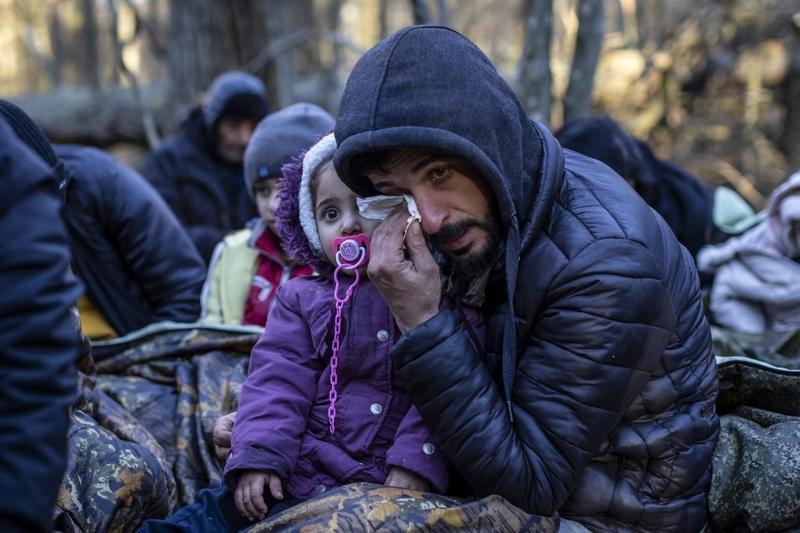 A man holding a child reacts as the members of the Kurdish family from Dohuk in Iraq wait for the border guard patrol, near Narewka, Poland, near the Polish-Belarus border on Nov 9, 2021. (WOJTEK RADWANSKI / AFP)
A man holding a child reacts as the members of the Kurdish family from Dohuk in Iraq wait for the border guard patrol, near Narewka, Poland, near the Polish-Belarus border on Nov 9, 2021. (WOJTEK RADWANSKI / AFP)
The European Union is planning to boost sanctions against Belarus over actions that are creating a growing migrant and humanitarian crisis on the bloc's eastern frontier.
The move comes after Polish troops used tear gas to prevent migrants ushered to the border by Belarus from storming a barbed-wire fence along the two countries’ border on the EU’s eastern edge. The standoff risks turning increasingly deadly as thousands of people from the Middle East are stuck in the forests along the EU border with temperatures dropping below zero.
An EU working group on Monday agreed to broaden the scope of the current sanctions regime directed at Belarus to include persons and entities supporting illegal border crossings, according to an official familiar with the decision
An EU working group on Monday agreed to broaden the scope of the current sanctions regime directed at Belarus to include persons and entities supporting illegal border crossings, according to an official familiar with the decision.
Adoption of the new criterion will likely happen on Nov 25.
Videos released on Tuesday by the Polish government, which has banned media access to the border region, showed people on Belarusian soil seeking to topple makeshift fences with tree trunks and using tools to cut through the barriers.
ALSO READ: Poland declares emergency on Belarus border amid migrant surge
Belarusian President Alexander Lukashenko spoke to Russia’s Vladimir Putin, while leaders of the three EU states bordering Belarus — Poland, Lithuania and Latvia — lobbied for EU support. The US State Department pledged to stand by its NATO allies at risk from “unacceptable actions” by Belarus.
Poland estimates that as many as 4,000 people were gathered near the frontier, out of more than 10,000 migrants expected to be in Belarus. Prime Minister Mateusz Morawiecki called the crisis the biggest security threat to Poland this century.
“Security of our eastern border is being brutally violated,” Morawiecki told a special session of parliament in Warsaw on Tuesday. The developments are part of Russia’s attempts to “rebuild its empire” in eastern Europe and may last years, he said.
Flight Focus
European Commission President Ursula von der Leyen said in a statement late Monday that “the Belarusian authorities must understand that pressuring the European Union in this way through a cynical instrumentalization of migrants will not help them succeed in their purposes.”
The EU is monitoring flights to Belarus from more than two dozen countries, including from Morocco, Syria, Iran, Azerbaijan, Algeria and elsewhere, to look for patterns of migrant trafficking. The bloc is looking at the frequency of flights, the occupancy of planes and other patterns as it contemplates possible sanctions of airlines involved in shuttling migrants to Minsk.
ALSO READ: Poland fears 'major incident' as migrants head for border
In Lithuania, parliament declared a state of emergency in the border region with Belarus for one month. The emergency zone will apply within five kilometers from the border and to the country’s three migrant centers.
Estonia’s prime minister, Kaja Kallas, said that sanctions should be accelerated against individuals and companies that support the Belarusian government’s activities, including airlines.
Russian Support
In May, Lukashenko threatened to allow drugs, radioactive material and illegal migrants to flow into the EU unhindered, saying Belarus won’t prevent people from countries “abused by the West” from crossing into the bloc. His administration faces sanctions after his political rivals fled a crackdown following a disputed election last year.
In his conversation with Putin, he called out Poland for taking “harsh actions” toward “peaceful people.” A shift by Polish armed forces to the border is a “case for special concern,” according to a statement from Lukashenko’s office.
Russia has staunchly backed its ally in Minsk in the crisis but rejected allegations it’s playing any role in encouraging the migrant flows.
ALSO READ: Kremlin concerned over migrant crisis on Belarus-Poland border
Foreign Minister Sergei Lavrov said on Tuesday that Europe bears the responsibility for resolving the crisis and blamed the West for causing it with its policies in the Middle East and North Africa. He warned the EU against what he called “double standards,” citing the example of European aid to Turkey to house Syrian refugees as applicable in the situation in Belarus.
“They don’t want to stay in Belarus,” Lavrov said. “They want to go to Europe, the very same Europe that for many years has advertised its way of life. One should answer for one’s words.”


